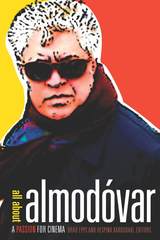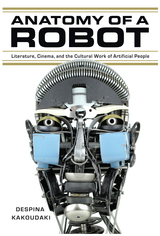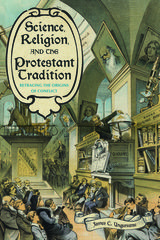2 books by Kakoudaki, Despina

All about Almodóvar
A Passion for Cinema
Brad Epps
University of Minnesota Press, 2009
New critical perspectives on the filmmaker behind All About My Mother, Talk to Her, and Volver
One of world cinema’s most exciting filmmakers, Pedro Almodóvar has been delighting, provoking, arousing, shocking, and—above all—entertaining audiences around the globe since he first burst on the international film scene in the early 1980s.
All about Almodóvar offers new perspectives on the filmmaker’s artistic vision and cinematic preoccupations, influences, and techniques. Through overviews of his oeuvre and in-depth analyses of specific films, the essays here explore a diverse range of subjects: Almodóvar’s nuanced use of television and music in his films; his reworkings of traditional film genres such as comedy, horror, and film noir; his penchant for melodrama and its relationship to melancholy, violence, and coincidence; his intricate questioning of sexual and national identities; and his increasingly sophisticated inquiries into visuality and its limits. Closing with Almodóvar’s own diary account of the making of Volver and featuring never-before-seen photographs from El Deseo production studio, All about Almodóvar both reflects and illuminates its subject’s dazzling eclecticism.Contributors: Mark Allinson, U of Leicester; Pedro Almodóvar; Isolina Ballesteros, Baruch College; Leo Bersani, UC Berkeley; Marvin D’Lugo, Clark U; Ulysse Dutoit, UC Berkeley; Peter William Evans, Queen Mary U of London; Víctor Fuentes, UC Santa Barbara; Marsha Kinder, USC; Steven Marsh, U of Illinois, Chicago; Andy Medhurst, U of Sussex; Ignacio Olivia, Universidad Castilla–La Mancha, Cuenca; Paul Julian Smith, U of Cambridge; Kathleen M. Vernon, SUNY Stony Brook; Linda Williams, UC Berkeley; Francisco A. Zurián, U Carlos III, Madrid.[more]

Anatomy of a Robot
Literature, Cinema, and the Cultural Work of Artificial People
Kakoudaki, Despina
Rutgers University Press, 2014
Why do we find artificial people fascinating? Drawing from a rich fictional and cinematic tradition, Anatomy of a Robot explores the political and textual implications of our perennial projections of humanity onto figures such as robots, androids, cyborgs, and automata. In an engaging, sophisticated, and accessible presentation, Despina Kakoudaki argues that, in their narrative and cultural deployment, artificial people demarcate what it means to be human. They perform this function by offering us a non-human version of ourselves as a site of investigation. Artificial people teach us that being human, being a person or a self, is a constant process and often a matter of legal, philosophical, and political struggle.
By analyzing a wide range of literary texts and films (including episodes from Twilight Zone, the fiction of Philip K. Dick, Kazuo Ishiguro’s novel Never Let Me Go, Metropolis, The Golem, Frankenstein, The Terminator, Iron Man, Blade Runner, and I, Robot), and going back to alchemy and to Aristotle’s Physics and De Anima, she tracks four foundational narrative elements in this centuries-old discourse— the fantasy of the artificial birth, the fantasy of the mechanical body, the tendency to represent artificial people as slaves, and the interpretation of artificiality as an existential trope. What unifies these investigations is the return of all four elements to the question of what constitutes the human.
This focused approach to the topic of the artificial, constructed, or mechanical person allows us to reconsider the creation of artificial life. By focusing on their historical provenance and textual versatility, Kakoudaki elucidates artificial people’s main cultural function, which is the political and existential negotiation of what it means to be a person.
By analyzing a wide range of literary texts and films (including episodes from Twilight Zone, the fiction of Philip K. Dick, Kazuo Ishiguro’s novel Never Let Me Go, Metropolis, The Golem, Frankenstein, The Terminator, Iron Man, Blade Runner, and I, Robot), and going back to alchemy and to Aristotle’s Physics and De Anima, she tracks four foundational narrative elements in this centuries-old discourse— the fantasy of the artificial birth, the fantasy of the mechanical body, the tendency to represent artificial people as slaves, and the interpretation of artificiality as an existential trope. What unifies these investigations is the return of all four elements to the question of what constitutes the human.
This focused approach to the topic of the artificial, constructed, or mechanical person allows us to reconsider the creation of artificial life. By focusing on their historical provenance and textual versatility, Kakoudaki elucidates artificial people’s main cultural function, which is the political and existential negotiation of what it means to be a person.
[more]
READERS
Browse our collection.
PUBLISHERS
See BiblioVault's publisher services.
STUDENT SERVICES
Files for college accessibility offices.
UChicago Accessibility Resources
home | accessibility | search | about | contact us
BiblioVault ® 2001 - 2024
The University of Chicago Press









